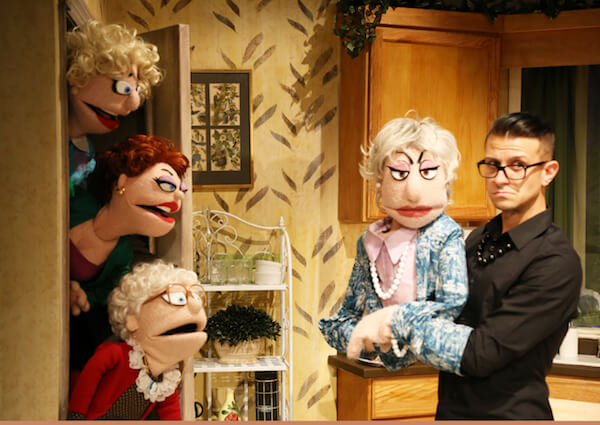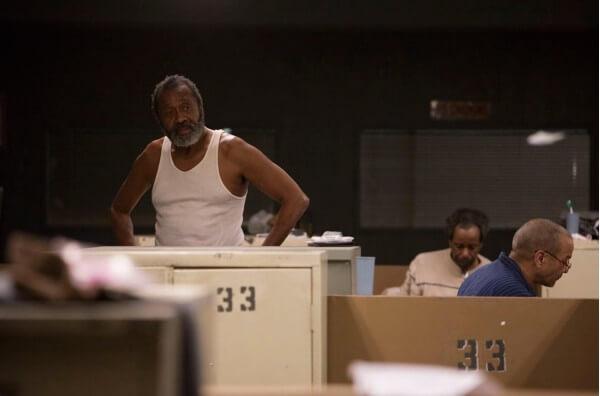Ed Asner recently drew a sell-out crowd to the Metropolitan Room for his new one-man show, “A Man and His Prostate.” You heard right. I went in, expecting it to be a joke title that would maybe address his recent medical travails lightly, while taking us on a tour of his incredibly prolific career as the all-time male Emmy-winning champ (with seven to his name).
Wrong! The show was, indeed, mostly about his prostate (complete with medical diagrams) and his arduous correctional operation, the marvel of which was just how very entertaining it was. Asner truly defines mensch in every sense of the word and it was a bracingly candid, sometimes very touching display of TMI, addressing, as it did, the inevitable aging process and mortality that we all must face. His adoring, cross-generational fans in the house laughed ’til they wept, and, heartened by this New York reaction, the 86-year-old deliciously feisty trouper is taking it on the road.
I arranged to interview him at the Paramount Hotel. I did not have his room number and had to ask three different employees who were not only inept but had never heard of him, before I espied him, sitting with his daughter in the lobby.
In the Noh: Ed Asner discusses his prostate –– and just about everything else
“Maid service hasn’t fucking arrived yet,” he greeted me, “ so we’re sure not going to my room.” Everywhere we went was freezing on that blustery winter afternoon, so he said, “Fuck it. We’ll go up.” And, in one of this boutique hotel’s miniscule rooms, he sat on the bed, offering me the one chair, and gave me deeply human, incredibly rich, and, typically for this resolute, ultimate Hollywood liberal, politically on-point conversation –– yes, he likes Bernie, but is realistic about his chances and abilities –– for more than two hours.
“My show runs an hour and a quarter and so far the reaction has been great,” he began. “I’m not a computer person at all, don’t even know how to call up programs but so far we have about six online reviews, and they’re all good. I guess there will be some people who will feel alienated because this show is me, not Lou Grant or the grandfather from ‘Up.’ But, you know I was always working to transition from ‘Mary Tyler Moore’ and ‘Lou Grant,’ pushing the plot du jour, so I got things like ‘Rich Man, Poor Man’ and ‘Roots,’ which really helped.”
Asner was surprised when I told him of people’s ignorance as to his identity. “Really? Well, tempus fugit! And you say one was Russian? That sonuvabitch should have known because that’s where my parents were from.”
Asner hails from Kansas City, “which was a big receiving place for Jews, amazingly enough, with a very effective welfare society which helped my family when they first came. They were what I call Midwestern Orthodox, because they certainly didn’t compare to the Hasids in New York. Our house was kosher and my father didn’t smoke on Shabbos, but when it came time to go to the synagogue –– he was a very hard working man, but distance was not his forte –– it was too goddam far, so he drove.”
Asner was the youngest of four kids, a late baby, and his sister just died last year at age 94.
“My father had a junk business, scrap iron, rags, paper. He bought everything, and God, what fun for a kid! He’d go to police auctions and would get barrels of jimmied pistols, which wouldn’t fire, of course, but they were good for kids.”
As for religion: “I don’t think about God at all. All I have to do is think of the Book of Job. Why should there be a God? I’m an ethnic Jew, and I identify with them and am proud of it.”
I asked if Asner ever encountered discrimination as a Jew in Kansas City.
“I did, some, but I would say to you that a little discrimination is very good for character building. I’m sure you’ve found out, too, that to be different from the herd is not pleasant for a kid, but it makes you a lot smarter than your peers.
“I was blacklisted from joining a fraternity in high school and when I asked my friend, ‘Is it because I’m Jewish?,’ he said, ‘Yeah.’ Had I been winning enough, they would have accepted me whether I was Jewish or not, but I wasn’t. I was delighted, however, and, like a stupid person, I gave my religion the ignominy of my blacklisting, which meant that I as an individual was totally free and unblemished. Bullshit. My whole childhood had been Hitler and anti-Semitism, with that common phrase, ‘Stop jewing me down.’”
Asner’s parents were uneducated people and not initially supportive of his acting aspirations.
“But to their credit, they didn’t lay guilt on me for my choice. My dad was dead by the time I started getting TV leads, but I’d tell my mom about it, and her one answer that endeared her to me forever, was, “Vell, ve vas wrong and I’m glad.’
“When I moved to Chicago and was acting there, I waited for the right play to invite them to see me. Finally, I played the old rabbi in ‘The Dybbuk.’ They came up from Kansas City and my mom had cooked up some chickens to bring with them so Dad would have something to eat. At the show, they sat next to two young girls and my mother made sure to tell them, ‘That’s our son.’ She was very pleased but my dad didn’t say anything. I found out when he went back home and they were asked about me, he said, ‘He was so good! He was so old! I wanted to get up on the stage and help him!’ This was 1953, and he died four years later.”
Asner moved to New York in the 1950s and his first break was in the legendary Theater De Lys production of ‘The Threepenny Opera,’ with Lotte Lenya and Bea Arthur. Rather than being wonderful, its long run was a nightmare for him. He said that it was the only job he ever had where he could not escape his feelings of insecurity. It began when, after almost three years, company manager Joe Lieberman came to him and said, ‘We got Jane Connell to be Mrs. Peachum, but you just don’t seem to be cutting it.’
“I had an understudy and every time I looked at him, I could see him honing that razor waiting for a chance to slice my throat. I automatically went on the defensive and I couldn’t for some reason check if this warning was just coming from him or was passed on from the producers. They never fired me, but I wanted to get out so badly.”
Asner got to the point where he would get in his own way, “fantasizing during performances that I would black out and forget my lines. When I finally left, it was to go serve as a replacement for a smaller venue Off Broadway, for a smaller paycheck, and I wasn’t going to get any reviews. But I was free, and had been a slave all that time in my first big, ‘wonderful’ break in the theater.”
As for his fabled co-stars, Lenya “looked like the tramp that she was, very appealing in her withdrawn, very seductive manner. But she was nice to everybody, especially nice to my understudy. And how could she not be electrifying on stage, coming with that whole history behind her? And then she was Kurt Weill’s wife. I never saw him at all.
“Bea Arthur was wonderful, smart, a big fucking tank. You ask if we could have ever foreseen back then that we would become TV household names, I would have to say no, but I never doubted that I’d get somewhere. I don’t know –– I had the actor’s all confidence and it never left me.”
Asked who was the most difficult person he ever worked with, Asner answered, “That’s very hard for me to say: they either fired me or I fired them. The best example I can give you is Jay Sandrich. When I was cast as Lou Grant in ‘The Mary Tyler Moore Show,’ it was decided to make a promotional scene to show to the advertisers –– the hiring scene with me and Mary –– and Sandrich, accomplished in comedy, was picked to direct us. I was new to comedy and he’d stick in all this direction and I thought, ‘Oh, fuck you, you little prick. I’ll take this now, but when the show is bought up, I’ll get rid of him tout de suite!’
“But I didn’t do that, for seven years of shows. Around the second year, this veteran cameraman, Bill Klein, was hired to replace our former one, who was retiring. He watched us rehearse and Jay and I got into our usual jawing match, ‘Who the fuck are you?’ When the scene was over, Bill called Jay aside and said, ‘You gotta be kidding me! If he gets pissed off, he’ll knock you on your ass!’
“Jay said, ‘Five will get you 10 we will have lunch together.’ He took the bet; we had lunch. As long as you can jaw and not swing, you’re all right.
“Betty White was a great trouper and I love her dearly. Mary? I haven’t been in touch with her for a couple of years. As far as I know, she’s not okay [diabetes]. When she goes to California, she doesn’t call me, and when I’m in New York, I’m too busy to call her. But I still love the show and enjoy it whenever I happen to watch it.”
Researching his career was exhausting –– the man has made seemingly at least three or four movies or shows a year for decades. His favorites are “‘Rich Man, Poor Man,’ a big achievement for me, my cumulative years of Lou Grant, ‘Family Man,’ which I made in Canada with Anne Jackson and Meredith Baxter, ‘Heads’ with Jennifer Tilly and Jon Cryer. ‘Up’ I’m very proud of, and ‘Elf.’ I had a delightful time making that.”
One of the most surprising and entertaining things about Asner, and his new show is the unbridled honesty and frankness about his love of sex, giving the lie to ignorant ageists who think that it all stops after, say, age 50.
“I have a beautiful lady friend of several years who, unfortunately, has pneumonia and couldn’t come here with me. I still love my first wife. She was tremendously supportive for 20-something years and we get together every week, usually with the whole family.
“But little things have crept in without my watching that kind of rankle me. ‘Where did you get that opinion, that attitude?’ And I want to swat her. People change on their own and she certainly has. Those times I get tired of the rat race of chasing women or having women chase me, I think about getting back together with my wife because you’re very safe when you’re married, you know about them.
“But then I think, ‘Well, she does this and thinks that.’ I betrayed her and let it be known to her, and I had to be sure to close the door behind me as I left, but she’s a good broad.”
Asner then fixed me with his intent gaze and said, “So you’re gay, right? You guys have a lot of sex?”
Instead of replying “Is the pope Catholic?,” I described my open relationship, which began when my partner and I fell in love while both otherwise involved. I said, “We were two korvas [whores] from the beginning, so I thought, ‘Let’s not bullshit each other here. We’re two men. In New York City. Temptation everywhere.’ So yeah, I have sex just about every day, and like you, I love it. I once gave someone a seven hour bj.”
Asner’s eyes widened.
“Really? And how do you know that word ‘korva,’ anyway?”
“Oh God, I’ve lived in New York for decades. I love and know more Yiddish than Korean! I just wish my parents had spoken more of it around the house, instead of only when they wanted not to be understood by me.”
“Well, it’s not too late. You could take language classes.”
“Well, I’m just so busy.”
And then, Lou Grant leaned in, and gave me the greatest quote of my journalistic career: “Suck less cock.”
Not much could follow that, so we wrapped it up. As we shook hands goodbye, his trademark crustiness dropped entirely, and he said, ‘Well, you’re a very warm and winning fellow. And if I ever decide to switch, I’m giving you a call.’”
Contact David Noh at Inthenoh@aol.com, follow him on Twitter @in_the_noh, and check out his blog at nohway.wordpress.com.



































